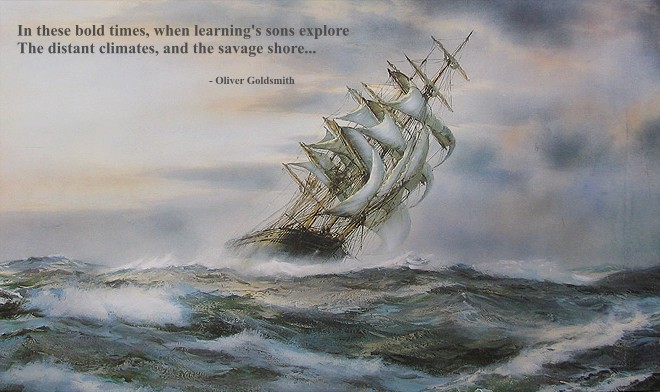Embarking on the spiritual journey is like getting into a very small boat and setting out on the ocean to search for unknown lands. With wholehearted practice comes inspiration, but sooner or later we will also encounter fear. For all we know, when we get to the horizon, we are going to drop off the edge of the world. Like all explorers, we are drawn to discover what's waiting out there without knowing yet if we have the courage to face it.
If we become interested in Buddhism and decide to find out what it has to offer, we'll soon discover that there are different slants on how we can proceed. With insight meditation we begin practicing mindfulness, being fully present with all our activities and thoughts. With Zen practice we hear teachings on emptiness and are challenged to connect with the open, unbounded clarity of mind. The vajrayana teachings introduce us to the notion of working with the energy of all situations, seeing whatever arises as inseparable from the awakened state. Any of these approaches might hook us and fuel our enthusiasm to explore further, but if want to go beneath the surface and practice without hesitation, it is inevitable that at some point we will experience fear.
Fear is a universal experience. Even the smallest insect feels it. We wade in the tidal pools and put our finger near the soft, open bodies of sea anemones and they close up. Everything spontaneously does that. It's not a terrible thing that we feel fear when faced with the unknown. It is part of being alive, something we all share. We react against the possibility of loneliness, of death, of not having anything to hold on to. Fear is a natural reaction to moving closer to the truth.
If we commit ourselves to staying right where we are, then our experience becomes very vivid. Things become very clear when there is nowhere to escape.
During a long retreat, I had what seemed to me the earth-shaking revelation that we cannot be in the present and run our story lines at the same time. It sounds pretty obvious, I know, but when you discover something like this for yourself, it changes you. Impermanence becomes vivid in the present moment; so do compassion and wonder and courage. And so does fear. In fact, anyone who stands on the edge of the unknown, fully in the present without reference point, experiences groundlessness. That's when our understanding goes deeper, when we find that the present moment is a pretty vulnerable place and that this can be completely unnerving and completely tender at the same time.
When we begin our exploration, we have all kinds of ideals and expectations. We are looking for answers that will satisfy a hunger we've felt for a very long time. But the last thing we want is a further introduction to the boogeyman. Of course, people do try to warn us. I remember when I first received meditation instruction, the woman told me the technique and guidelines on how to practice and then said, "But please don't go away from here thinking that meditation is a vacation from irritation." Somehow all the warnings in the world don't quite convince us. In fact they draw us closer.
What we're talking about is getting to know fear, becoming familiar with fear, looking it right in the eye — not as a way to solve problem, but as a complete undoing of old ways of seeing, hearing, smelling, tasting, and thinking. The truth is that when we really begin to do this, we're going to be continually humbled. There's not going to be much room for the arrogance that holding on to ideals can bring. The arrogance that inevitably does arise is going to be continually shot down by our own courage to step forward a little further. The kinds of discoveries that are made through practice have nothing to do with believing in anything. They have much more to do with having the courage to die, the courage to die continually.
--When Things Fall Apart: Heart Advice for Difficult Times (Shambhala Classics), by Pema Chodron
The Empire of Time — A Philosophical Angle
-
The search for something permanent is one of the deepest of the instincts
leading men to philosophy. It is derived, no doubt, from love of home and
desire ...






No comments:
Post a Comment